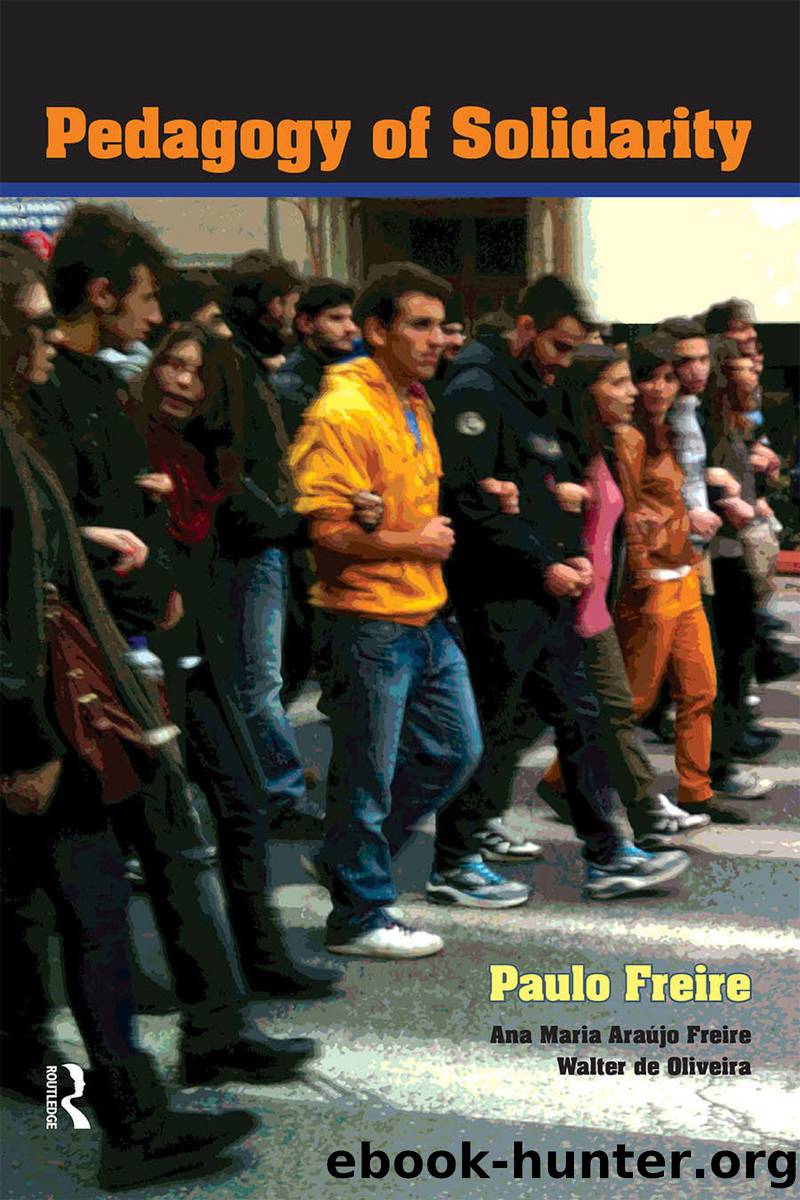Pedagogy of Solidarity by Freire Paulo;Freire Ana Maria Araújo;de Oliveira Walter;Giroux Henry A.;

Author:Freire, Paulo;Freire, Ana Maria Araújo;de Oliveira, Walter;Giroux, Henry A.; [Freire, Paulo]
Language: eng
Format: epub
Publisher: Taylor & Francis Group
Published: 2022-06-02T00:00:00+00:00
Chapter 4 For a Pedagogy of Solidarity
Walter Ferreira de Oliveira
DOI: 10.4324/9781315422817-4
To doubt what is right and not what is questionable, here is wisdom.
Celestin Freinet
Fatalism and Compliance: Pedagogy of Oppression
Paulo Freireâs work repeatedly invites us to reflect on the identity of the educational process. It is not uncommon in our society to hold a vision of education strictly as a set of learning mechanisms with their valuation strongly linked to the formal, and valued usually only when it is education âacquiredâ at schoolâthe courses offered by formally accredited educational institutions. But, from Freireâs view the educational process is much more than the knowledge acquired didactically in formal institutions. Education is for him a key to the management of our own dilemma of human existence, a transcendent phenomenonâboth a tool and a field of creation. It can be used as an adaptation scheme or can be exercised as a locus of personal maturation, which involves the exchange of knowledge and the creation of a social dynamic for building new knowledge. In this sense, education is an epiphenomenon, a reflection of the cultural, social, and political through interpersonal relationships, communities and institutions.
Education is thus a transforming agent of these structures. It is not a neutral activity, but a territory of development and mobilization where intense clashes and conflicts are experienced. The question of identity is intertwined with the teaching of the fundamental questions of epistemology. Melvin Rader (1976) helps us to locate these questions: âHow do we know? How can we know? How do we know this? How can we distinguish between appearance and reality? What is the nature of the truth and how do we distinguish what is true from what is false?â This approach includes education with, in the words of Rader âundying issues,â the main problems of philosophy, the questions that insist on not being ignored.
To examine human existence in its knowledge, structures, interrelations, intricacies, nuances, and idiosyncrasies; to decipher meanings, symbolism, representations, and practices; and to study societies, forms of association between people, organizations, movements, and institutions as well as models, paradigms, and ways of life, this is the crux of education, and it can be considered the heart of the social sciences and humanities. The object of education is the study of the system of relationships, human and environmental, whose balance and harmonization is defined by the conjunction and application of knowledge.
For the inevitably central object of study of these relationships one returns to education and pedagogical processes. Our institutions, our professional actions, our customs, and much of our mental life are conditioned by social and educational processes experienced in school environmentsâvocational and academicâas well as through social and educational structures external to formal education. Most of these educational relationships take place informally, in the context of social and cultural influences that also constitute teaching and function as shared teaching and learning.
The analysis of this social and cultural process we call education triggers knowledge beyond the technical and expands the universe of knowledge. It allows us, for example,
Download
This site does not store any files on its server. We only index and link to content provided by other sites. Please contact the content providers to delete copyright contents if any and email us, we'll remove relevant links or contents immediately.
The European History Highway: A Guide to Internet Resources by Dennis A. Trinkle Scott A. Merriman(494)
The Seven Wonders of the Ancient World by Michael Denis Higgins(476)
European Security in a Global Context by Thierry Tardy(470)
European Security without the Soviet Union by Stuart Croft Phil Williams(469)
The Routledge companion to Christian ethics by D. Stephen Long Rebekah L. Miles(458)
Hudud Al-'Alam 'The Regions of the World' - a Persian Geography 372 A.H. (982 AD) by V. V. Minorsky & C. E. Bosworth(399)
Gorbachev And His Generals by William C. Green(391)
Get Real with Storytime by Julie Dietzel-Glair & Marianne Crandall Follis(390)
Tibetan Studies in Comparative Perspective by Chih-yu Shih Yu-Wen Chen(385)
Governance, Growth and Global Leadership by Espen Moe(381)
Hyperculture by Byung-Chul Han(378)
CliffsNotes on Fitzgerald's The Great Gatsby by Kate Maurer(360)
The Oxford History of the World by Fernández-Armesto Felipe;(354)
How Languages Are Learned 5th Edition by Patsy M Lightbown;Nina Spada; & Nina Spada(352)
The Egyptian Economy, 1952-2000 by Khalid Ikram(351)
Oral Poetry and Narratives from Central Arabia: The Poetry of Ad-Dindan : A Bedouin Bard in Southern Najd (Studies in Arabic Literature, Vol 17) (English and Arabic Edition) by P. M. Kupershoek P. Marcel Kurpershoek(343)
The Oxford Handbook of the Incas by Sonia Alconini(333)
Europe Contested by Harold James(319)
The Hutchinson Dictionary of Ancient and Medieval Warfare by Peter Connolly John Gillingham John Lazenby(305)
